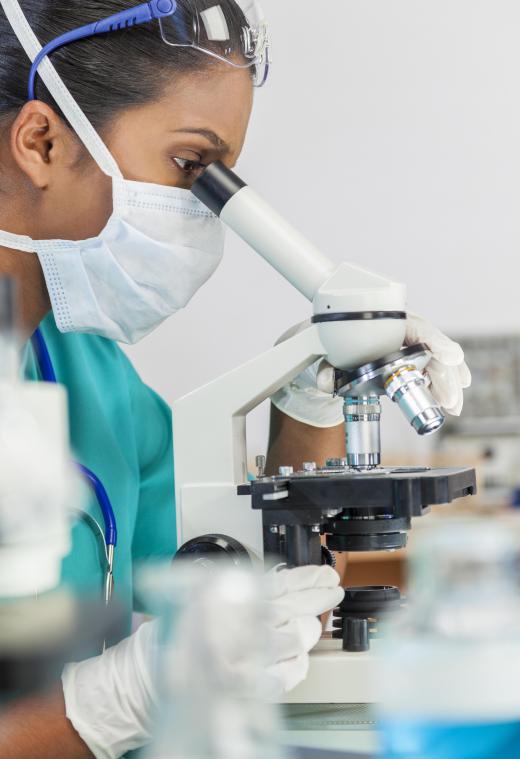Can Your DNA Change During Your Life?
 Tricia Christensen
Tricia Christensen
Many people are used to thinking of DNA as unchanging programming that governs all the body's responses for the rest of a person's life. In essence, certain things about our DNA are unlikely to change, ever. There are a number of outside things that could result in minor DNA change, however.
As you age, for instance, you may note DNA expression changes in a variety of ways. Hair gets gray, skin gets wrinkly, and diseases are more common. The effect of environmental influence on DNA is still being studied intensely, but there are some certain known features. For one thing, changes in DNA may really be better called mutations. The programs in certain cells don’t work as well, and this is reflected in aging. Exactly why certain codes, such as to produce tight skin, don’t work as well isn’t fully known. There is strong supposition, though, that things like sun exposure may change how well DNA operates.

Similarly, DNA builds cancerous cells and this is accepted as mutation of DNA’s original intent, since people aren’t supposed to have cancer. There are several factors at work here too. For some reason, the program of DNA misfires, resulting in abnormal cells. DNA may already influence how likely individuals are to have cancer, and the environment may have effect on DNA, resulting in production of cancerous cells.

Mutations in the DNA have also been noted with the introduction of certain viruses into the body. In fact, this is a method by which “gene therapy” is being studied in depth. Scientists and medical researchers are using small virus cells, usually of common illnesses like colds, to change small parts of gene expression, since it is known that viruses may rewrite some of the DNA code.

By some of the code, it should be understood that DNA change is incredibly tiny, governing very few expressions of certain genes. Most of your building block DNA does not undergo change, and it is not likely to. There has been an upsurge of theory in alternative health and self help fields about how changing thinking might result in changing DNA. This is unproven work, though there are some interesting changes that science has noted. One is a noted ability for people who have undergone trauma to evolve new neural pathways in the brain when undergoing therapy like cognitive behavioral therapy, but this may simply be an expression of what your brain cells are already coded to do.

Another interesting field that relates to this subject is that of epigenetics, which evaluates how environmental influence may affect the DNA of your children. Previously, DNA code in reproductive cells was thought to be unchanged, except by mutation. Now scientists are evaluating how it may be changed by slight differences in the way people behave before they have children.

Your DNA may not just be a matter of inheriting family traits like hair or eye color or risk for certain diseases, but might also be influenced by how your parents behaved, such as being overweight or smoking prior to conceiving children. This has led some to conclude that people who wait until they are older to have children may have significantly changed the DNA of their future children though life choices and environmental exposure.
AS FEATURED ON:
AS FEATURED ON:















Discussion Comments
Fascinating! I am learning about epigenetics in college and was wondering if our actions can modify our actual strands of DNA. Really enjoyed this!
@ GlassAxe- Ionizing radiation has a negative effect on DNA (radiation from x-rays, etc.). The Clinton Administration established a committee to study the effects of ionizing radiation on humans. The Advisory Committee on Human Radiation Experiments, studied human effects from many events including the aftermath of Hiroshima and the human effects of researchers of the Manhattan Project.
In their research, they concluded that ionizing radiation has the ability to break the chemical bonds of molecules in our body. Radiation affects DNA molecules in two ways. In a direct action, a radioactive isotope ejects an electron that directly affects the DNA molecule, potentially causing genetic mutations. In an indirect action, the free electron strikes a water molecule, causing it to become a free radical (an unstable molecule). This free radical drifts around looking for another molecule to react with, potentially a DNA molecule.
Long-term exposure to somatic cells will result in cancer, while long-term exposure to germ cells (egg and sperm) can lead to genetic mutations.
I was searching the web for information on the effects of radiation on DNA and this article caught my eye. I did not see much about radiation specifically, but I did read that cancer is related to changes in DNA.
I want to go to school to become a radiologist, but I have a long family history of cancer. I am wondering if radiation exposure can cause DNA mutations, and eventually cancer. I assume nuclear medicine is safe, but I am just curious to know what the effects of radiation are on cells and DNA. Can anyone help me with this?
Post your comments